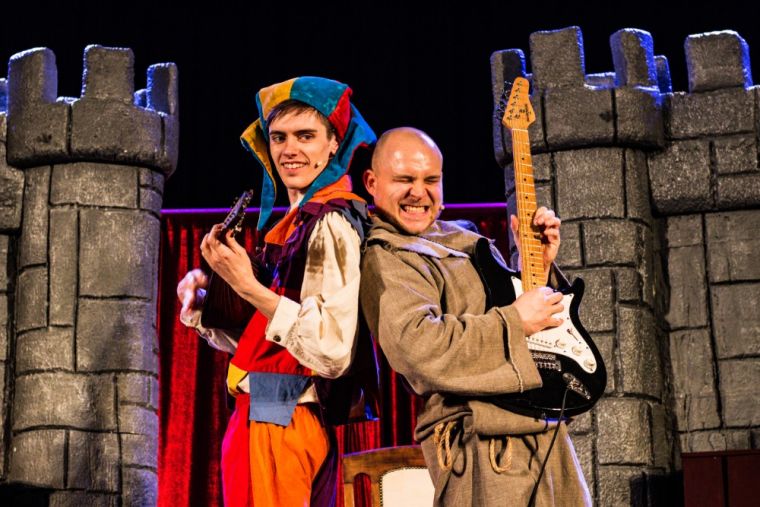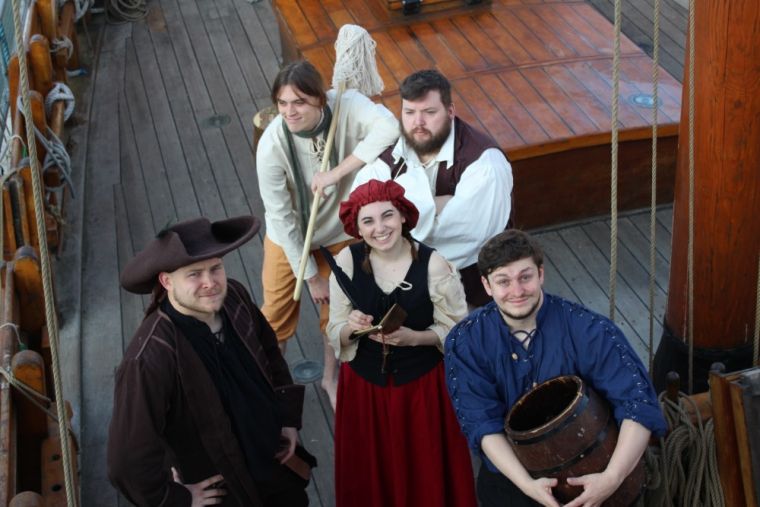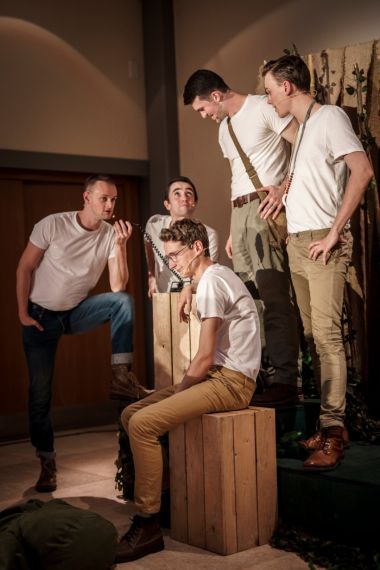Will Covid-19 be the death of theatre?

4Front Theatre was halfway through a 90-date tour when the country went into lockdown. The rest of the Christian theatre company's tour was cancelled and other projects were put on hold indefinitely.
While other parts of the country have been trying to re-open, social distancing presents massive challenges for the theatre industry and its very survival is under threat.
Christian Today spoke to 4Front Theatre's Artistic Director Rob Holman to find out more about the impact Covid-19 on the theatre industry, how companies like his are surviving, and what the future might hold.
CT: It must have been devastating to cancel everything when Covid struck. How has the pandemic impacted you?
Rob: We were halfway through a tour when lockdown hit. We were visiting schools, churches and community venues, and it was just a great fun, family show. We had 90 bookings in total for this particular show and had done about 45 of them when lockdown was announced. With very little warning, the rest of the shows had to be cancelled. It was going brilliantly, the feedback had all been so positive, and people were so excited to have us, so yes, it was devastating.
CT: Have you been able to do anything else since then?
Rob: In terms of theatre, not really and most theatre companies that we know equally haven't been able to do anything. One or two have been doing outdoor theatre and there have been a few socially distanced performances, but outdoor theatre is a very different kind of world and unless you are already specialising in this kind of theatre, most places just haven't been able to do anything, which is a shame.
Even though some things had started to ease up, like the resumption of church services and sporting events, theatre hasn't really been on that list. There are some exceptions that have allowed theatres to open up with limited numbers but on a practical level, it isn't really financially viable for theatre companies to try and do something on that basis.
It's the uncertainty of it all. There are new lockdowns across whole chunks of the north of England. No theatre producer wants to line up a cast, spend however much on props and costumes, and organise the venue and everything else involved in a production, knowing that at any minute the Government can just turn around and say we're not allowed out anymore.
CT: So is theatre basically cancelled for the rest of 2020?
Rob: In terms of theatre, generally speaking everything is a bit cancelled. There are a few grassroots projects and a few plucky groups still trying something. Time will tell how well things go for them. But a lot of theatre companies and performers have moved to film, online projects and video resources, and that's what we've been doing at 4Front.

We had been planning to tour schools and churches with a show looking at the faith aspect of the Mayflower for the 400th anniversary this year. Because of coronavirus, the tour has had to be cancelled but we've been filming a miniseries of the show instead that will then go out to schools. It's good but it's very different from doing theatre.
Something else we've been doing, which my wife and I started during lockdown in collaboration with our church, is virtual Sunday school. We put it online and it now has over 3,800 subscribers, and the videos have each got thousands of views. It's not theatre but it's engaging with people.
CT: So Covid has drastically changed your ministry? Are you having to scramble to learn new skills?
Rob: We were in the privileged position of having done some film stuff before for online content and social media. So it wasn't completely new ground for us but there are plenty of things we're having to learn, and we're having to change the way we do things.
For many in theatre, it's completely new and it is a bit of a wild scramble trying to put something out online that looks decent, because online is a completely different ballgame. Online production requires a completely different skillset from classic theatre so for some in the industry, it's been a steep learning curve.
CT: Do you think theatre will ever be able to go back to 'normal'? Or have you resigned yourself to a 'new normal' for now?
Rob: We're very much taking the approach of 'we need to adapt', and see how long we need to keep this up. To some extent, we're used to rolling with the punches and doing whatever. But in terms of classic theatre, the honest answer is I don't know. Certainly, it won't be going back to 'normal' this year and it will be an interesting Christmas without all the pantos and so on.

Actually for a lot of theatres, Christmas is a big money maker. That's where they often have a project that is viable and able to fill the seats. Panto brings in money to sustain them and enable them to do lots of other artistic things throughout the year. So without that, I think there are going to be a lot of theatres and companies out there in difficult positions.
CT: The Royal Albert Hall recently launched an emergency appeal because it fears it may not be able to survive coronavirus. If the world famous Royal Albert Hall is facing ruin, how much harder is it for smaller theatres and companies that don't have that level of international prestige?
Rob: We're fortunate in that we're a bit more community-based. We're smaller and we're a touring company, so we don't have the massive overheads of a huge venue, and we don't have the same large teams and salaried office staff. We can make some cuts without impacting on livelihoods to the same extent. But having said that, we use a lot of freelancers and actors, and all of our actors at the moment just don't have work.
Freelance actors live from acting job to acting job even in the best of times so it's an interesting world for them right now, and they're all scrambling to try and find something online. There's filmed content out there but it's very competitive, so the actors we've been working with this week were just very grateful to be doing something because they haven't been able to do anything for so long!
CT: Do Covid regulations mean that production crews are much more pared down now?
Rob: Yes, what film and TV looks like now is very different from how it looked before coronavirus. Even the project we're working on now is a much smaller project with a much smaller budget. Normally the guy who's coming in to do the filming would bring a couple of extra crew to help out, but because we're trying to do everything in the most Covid secure way possible, we've got a limited cast who stay in their bubble and aren't allowed to see anyone apart from each other for the duration of the project, and we have just one cameraman doing everything as a one-man operation.
We're trying to be as Covid secure as we can to limit the chance of anything spreading. But if we want to do anything and do it safely, it means that a team that could have had 12 people in it is all of a sudden down to six. That's been our experience for a really small-scale project so if you look at big theatres with big budgets, in order to limit contact, they've got to limit their manpower. Even if projects do go ahead, there will be less work available and the teams will all be smaller.
CT: You were part of the Edinburgh Festival Fringe before and had been due to take part again this year before it was cancelled. When you are not able to take part in large-scale events like the Fringe, which by their nature bring in a lot of people, does it make it harder to promote or find exposure for your projects?
Rob: When there are fewer events, it means there is less hype to encourage people to go along to shows and festivals. That can be a really significant thing for people trying to gain initial experience and find new platforms for their work. It's only the people who've already got some experience under their belt who can now adapt. It's going to be harder for start-ups and people trying out new things.

The other thing, though, is that there are fewer people to be your audience. The world of classical theatre in particular tends to appeal to an older demographic. With Covid and all the restrictions around that, there are certain pockets of theatre that are going to struggle to stay afloat. Some theatres relied on retired people, so without that demographic able to come along like they were before, that's a big chunk of your audience missing and with that, a big chunk of your financial income. Then added to that are all the people who would maybe go along but are now too fearful because they have a grandparent or other vulnerable person in their circle and they just don't want to put them at risk.
We're in such a state of flux and the rules seem to change every other day, so people don't want to do much at all because they don't know what the state of play is. They don't know if they're going to get in trouble or if they're going to be safe. It's all so uncertain that there's less risk-taking and there are fewer people going out to try new things. In the same way, there are fewer people prepared to go along to the theatre.
CT: Do you know if this has caused people inside the theatre industry to just quit and pursue other lines of work now?
Rob: Yes, we know some actors who have decided to go and pursue teacher training or other lines of work that are a little more dependable. Being a freelance actor has always been an interesting job because you're walking on a bit of a tightrope. Right now, it is not a good career to be in so I wouldn't be surprised if a lot of people do quit the industry.
CT: You were running a very successful prison ministry before coronavirus. Has this been affected?
Rob: We had a prison tour lined up for June and July, which of course had to be cancelled. Even in normal times, it's very easy for a prison performance to be cancelled - so much so that whenever we have planned a theatre tour in prison, we have always anticipated up to the very day we were due to perform that it might be called off. Prison performances can be cancelled for any number of reasons in the best of times, but with Covid, prison governors have got a lot on their plate as it is.

It's a shame because every time we go into the prisons, it's one of the most appreciated performances we ever do and some of the responses we get from the prisoners are unbelievable. But for now, it's just not viable.
CT: Do you think you will be able to resume shows in 2021?
Rob: Because we're small, we're considering doing something at Christmas, perhaps a low-key, socially distanced performance for a few churches or schools. But it won't be theatre as we know it. If it happens, it will be a two-person show, with those two people self-isolating together for the duration. Plan A would be to do a socially distanced performance in a church or possibly a classroom with one bubble class. Plan B would be to livestream to the audience from a separate venue. Plan C would be to send out a pre-recorded performance. As you can see, the thing about planning anything in the age of Covid is that we need so many layers of contingency for it to be worth doing!
CT: What do you think about the theatre industry in general? Can it pull through this time?
Rob: I think certainly the idea of theatre - the art. But the industry itself, I don't know. I think it will be a matter of some companies and theatres being able to weather it until things start moving again in 2021 - that's the hope at least. I'm sure there will be plenty that do pull through and while Covid may have crippled it for a while, I don't think this will be the death of theatre.
CT: Have there been any lessons from the Covid experience that will carry through into how you do theatre in the future?
Rob: There are definitely practical lessons to learn around doing things online and with film, because that is a very different skillset. It's very useful and it may be that even after Covid, companies continue to go more in that direction. There's a lot to learn not only about how we do things online, but how we be creative online.

In some ways, it's a similar challenge to the one churches have had to face because all churches have realised that they need to go online now. How you do theatre and how you do church actually have some things in common because it's so immediate and you're engaging a live audience. Covid has forced churches to think about how they should take what they've always been doing and do that online, in a virtual manner. You always lose something doing things online and it's not quite the same as being there in person, but there are certain things you can do to enhance the experience for your audience.
As a nation, I think the lesson we're being taught through this is the value of coming together, whether that's through theatre and live music events, or everyday things like a family barbecue. There's something inherently valuable in being together and that's something that theatre has over film. There is this togetherness and a sense of community that comes through theatre - even if the theatre is rubbish! There's something in everyone coming out and enjoying - or hating - an experience together. There's something special about that and Covid has shown us just how much we miss it.
CT: What would you like people to pray for?
Rob: Pray that we would be open to where we should go. For us, I think the flexibility inherent in being a smaller, touring theatre company is one of the reasons we are still doing stuff. And we haven't held onto what theatre looks like or a particular idea of how we should do theatre. We're adapting and changing. But pray that we would be able to do that in a way that would still be putting God at the centre of it and still creating something that has a community vibe, even if we can't be physically together. Pray that even if we end up having to do film completely, we'd still hold onto something of the value of theatre in bringing people together through the art we make.











